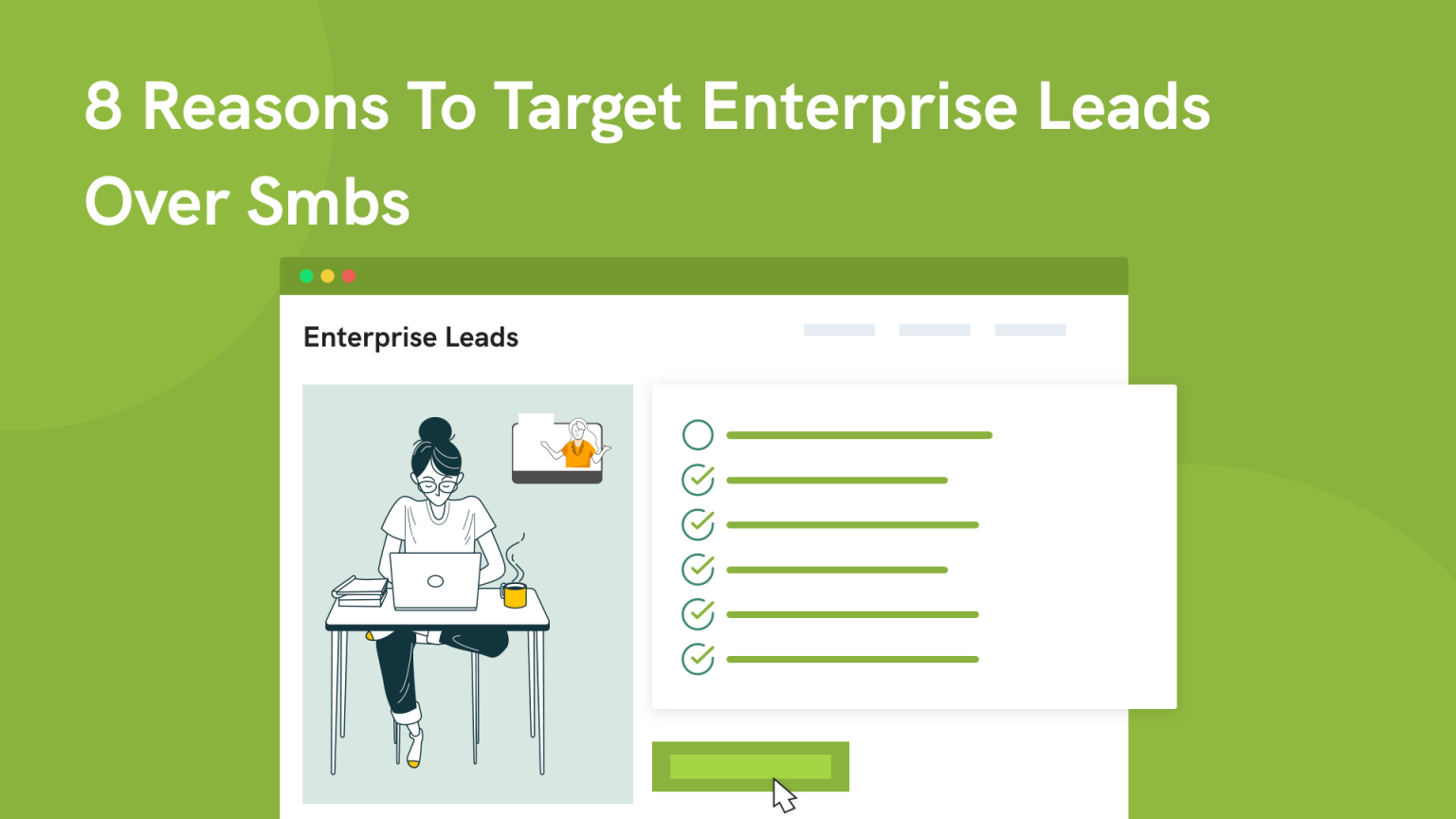Knowing where to allocate your time and resources can be challenging for lead generation.
Do you target small businesses (SMBs) with your marketing efforts? Although this may seem logical to start, you may miss out on more significant opportunities if you fail to target enterprise leads.
So What is SMB Marketing?
SMBs refer to small and medium-sized businesses.
‘SMB sales’ is applied to people selling products or services to small and medium enterprises. Many of these companies (SMBs) have fewer than 500 employees and are startups, local businesses, or small firms.
An SMB’s marketing approach will be significantly different in comparison with Enterprise Marketing strategies due to its limited resources and lack of employees.
Build trust & FOMO
Highlight real-time activities like reviews, sales & sign-ups.
What is Enterprise Sales?
Selling to large organizations is Enterprise Sales.
Every sale can, however, become an enterprise sale when there are high stakes, such as:
- A product that has a significant impact on the company,
- It’s on a multiyear contract,
- The implementation is complicated,
- The risk is high.
With enterprise sales – your clients become more complex, and contract prices increase.
You will probably see your selling cycle lengthen or become more difficult as you close larger, higher-value deals.
Typically enterprise sales are long and complex. Enterprise sales:
- Demands more touchpoints,
- And a comprehensive strategy (compared to SMB).
Taking into account the differences between Enterprise Marketing strategies and SMB Marketing. The following are 8 reasons we believe you should target enterprise leads and not just SMBs:
- Enterprise leads: More strategy but Less cost
- Larger budgets and higher spending
- Enterprises are Looking for long-term partnerships
- The Preference among enterprises to buy sooner
- Enterprises are more likely to give you referrals
- Deals are bigger with Enterprises
- Opportunities to cross-sell to Enterprise leads
- Acquisitions of Enterprises are Fewer, and they last longer.
1) Enterprise leads: More strategy but Less cost
Easily accessible: In the Fortune 500, there are only 500 companies, so you know who to target.
As a result, your lead generation campaigns will be highly targeted and less expensive than broad-based campaigns familiar to small businesses.
Tips for Tackling Enterprise Leads:
A. Establish your (ICP) Ideal Customer Profiles. You might have had a very straightforward ICP if you’d been selling to SMBs – you might have just needed to convince a user or perhaps a team leader.
However, you’ll probably be marketing yourself to a broader group of more senior individuals to sell to the enterprise.
Don’t forget about end-users. Essentially, it would help if you appealed to both the end user and the more senior people in the enterprise. Having to balance this line in the sand cannot be avoided.
Who is your Key senior decision-maker?
- The IT department head?
- The finance manager?
- Chief executives?
- Operations VP?
Identify this first, then understand every aspect of their world – their concerns, pain points, and pressures.
Next, you must make a connection between their world and your offering.
B. Determine why and how you’re able to solve your ICP’s problems
This is the most challenging part. You’ve successfully sold your product to a more junior buyer at an SMB.
Despite this, it doesn’t mean the “VP of Operations” (or whomever this persona represents) understands what you provide.
That VP is attempting to deal with a lot of problems at the moment, and unless:
- Your offer is addressing some of those problems (you finally figured it out)
- And why it is the best solution for the VP
She (The VP) won’t talk to you. No matter how much money you spend on your campaigns.
To do this well, you need to conduct extensive research, communicate with those people, understand the actual value of your product, and be able to connect your product to the market.
Be cautious not to underestimate this challenge.
2) Larger Budgets and higher spending
A significant budget funds almost everything an enterprise does. Even the smallest company in the Fortune 500 has revenues of $5.5B.
For F1000 companies, the most negligible revenue is around $1.8B. Forbes 2000 companies are the largest in the world according to income, profits, assets, and market capitalization.
Their smallest 5 companies average $5B (And that’s just the smallest). Several of them are multibillion-dollar corporations, and money isn’t an issue.
Whatever you are trying to sell to them, they can afford it.
3) Enterprises are Looking for long-term partnerships
This means enterprises are more likely to stick with you once they’ve made a purchase.
When an enterprise is looking for a long-term partner, they’re not just looking for someone who can provide them with a product or service.
They’re also looking for someone to help them grow and scale their business.
If you can show an enterprise that you’re committed to helping them grow and scale, it’s more likely that they’ll work with you long-term.
There are several ways to show an enterprise that you’re committed to a long-term partnership:
Invest in their success
Show the enterprise that you’re invested in its success by investing in its growth. This could mean providing them with resources, training, or support to help them grow their business.
Build a relationship
Get to know the enterprise and build a relationship with them. Show them that you’re not just interested in making a sale but that you’re interested in helping them reach their goals.
Offer value-added services
In addition to providing them with your product or service, offer value-added services that will help them grow their business. For example, you could provide consulting, data analysis, or marketing support.
By showing an enterprise that you’re committed to a long-term partnership, you’re more likely to win their business and keep them as a customer for the long run.
Build trust & FOMO
Highlight real-time activities like reviews, sales & sign-ups.
4) The Preference among Enterprises to buy sooner
As compared to SMBs, enterprises have very different purchasing habits, owing to their enormous budgets.
Due to those budgets, Enterprises don’t have the time to research and compare products the way SMBs do (if Enterprises like your product/service).
When pitching to Enterprise prospects, keep these other benefits in mind:
- They (Enterprises) can buy the product they need and be done with it
- Businesses selling to enterprises can benefit greatly from this
- Enterprises are generally more willing to pay a higher price for a product,
- And they’re also more likely to make a purchase quickly.
Essentially, If you can get your offering in front of an enterprise buyer, you’re more likely to make a sale.
Of course, selling to enterprises isn’t easy. You’ll need to have a high-quality product, and you’ll need to be able to show that your product is worth the price tag.
But if you can do those things, selling to enterprises can be a great way to grow your business.
5) Enterprises are more likely to give you referrals
Enterprises that end up being your clients are a valuable source of leads for your sales team.
They’re more likely to know other businesses that could use your products or services, and they’re usually happy to help you make a connection.
In addition to the fact that larger accounts are likely to deploy more aggressively, brand names are essential to future business both as references for prospects and as testimonials for Marketing.
The positive review of a well-known enterprise goes far more in terms of credibility than that of a smaller, unknown company.
Build relationships with key decision-makers to maximize enterprise referrals.
And be sure to stay in touch after the referral is made – following up shows that you’re interested in helping them succeed.
6) Deals are bigger with Enterprises
As large, well-established companies with both employees and customers, enterprises have significant needs for users, usage, data, and many other metrics.
Because enterprises use services more broadly and heavily, their deal sizes are more significant than ordinary SMBs. And Large deals help companies grow faster.
7) Opportunities to cross-sell to Enterprise leads
Enterprises are enormous organizations with a lot of needs. After you become a reliable vendor, you will be able to cross-sell other products to the enterprise.
It can be the same group as the one you’re currently selling to or a different one.
Most Enterprises prefer to deal with fewer vendors overall rather than more (but not just one for an essential service as described above), so if you can solve multiple problems for them, their vendor list will shrink.
8) Acquisitions of Enterprises are Fewer, and they last longer.
Acquiring large companies is more complex and expensive. More prominent companies can only afford them, and even then, integration can be challenging.
Enterprises, even if acquired, are more stable, and staff changes and technological changes are more gradual than those in SMBs.
When an acquired company is so big and has so many integration issues, they are often left unattended for a long time.
In other words, your solution will not be immediately exposed to any cancellation or consolidation if it becomes your customer.
Conclusion
So, where should you focus your lead generation efforts?
Social proof is one of the effective ways to generate leads.? It depends on a few factors, including the size of your business and how much money you want to spend.
For fast growth, the enterprise is an excellent market to target. However, it won’t be easy.
Enterprise customers have high expectations. Your sales, marketing, and customer service teams must prepare for a long and challenging road.
Despite this, with a powerful enterprise marketing strategy – success is possible if you persevere.
The investment will be well worth it, and it will drive growth for many years to come.
So, which type of lead do you find most valuable for your business?
Author Bio:
John B. Martyn has been working with SaaS-based products for over half a decade. In addition to learning new things, he enjoys writing. Currently, he works for Brightest Minds, where he writes and edits content on Lead Generation strategies.
Email: john.martyn@brightestminds.io




